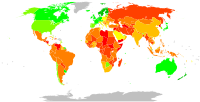
Photo from wikipedia
ABSTRACT Existing research on corruption in Asian business has focused on issues of causation, manifestation and impact, but with little attention paid to how corrupt practices evolve over time. Despite… Click to show full abstract
ABSTRACT Existing research on corruption in Asian business has focused on issues of causation, manifestation and impact, but with little attention paid to how corrupt practices evolve over time. Despite two decades of empirical evidence of changing work values among Asian managers, we know little as to how, why and to what extent this affects their corollary attitudes and behaviours towards corruption. Focusing on ‘responsible’ cronyism – as indicative of pressures to adapt current crony practices – we pursue an interview-based investigation in the emerging economy of Myanmar. Findings uncovered significant heterogeneity in participant perspectives towards responsible cronyism, seen variously as a West-East hybrid progression, a reversion to traditional Burmese values and an instrumental negotiation tool. Implications for how we understand changing attitudes to corruption in Myanmar (and emerging Asia) for both theory and practice, along with future research directions are discussed.
Journal Title: Asia Pacific Business Review
Year Published: 2019
Link to full text (if available)
Share on Social Media: Sign Up to like & get
recommendations!